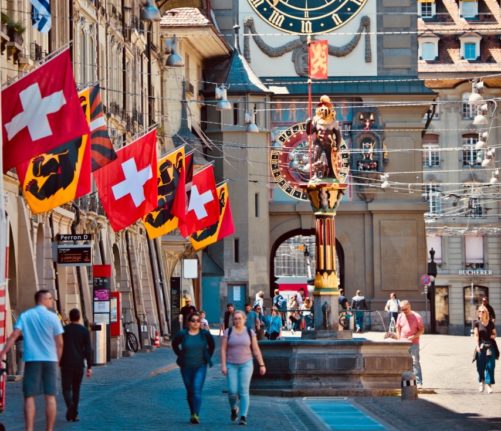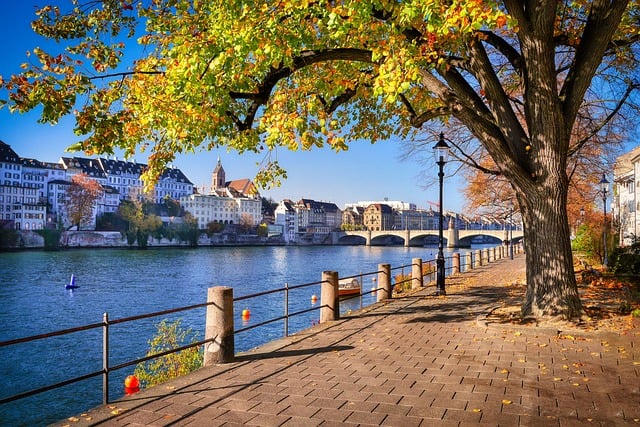The Swiss regional stereotypes you need to know

Are people from Zürich really loud and proud and those who live in Zug all loaded with money? Lily Töngi-Andrews takes a look at the Swiss regional stereotypes and whether there's any truth to them.
There are certain stereotypes foreigner have about Switzerland that just aren’t true’ but what about the clichés that have developed within Switzerland for certain cantons?
Are the locals in Zürich really arrogant? Are the folk in Bern living the slow lane? Is anyone who lives in Geneva actually from Geneva?
Let's take a look.
Aargau
It seems that the canton on Aargau receives the most flak from the rest of Switzerland. To start with the car number plates begin with AG, and the cliché goes that it stands for Achtung Gefahr, translating as "attention danger" in what is a criticism of their driving ability. They are known for wearing white socks, having moustaches and are apparently a little bit naïve.
Neighbouring Zürchers call them Pendlers (commuters) who go to work in Zürich because of the jobs and strong economy.
Argau is often referred to as Rüebliland (carrot land), an agricultural canton, and is known for it’s Rüeblitorte (carrot cake). According to the Kanton Aargau website they are unsure how it got this name but it isn’t related to eating or growing carrots, however, every year the capital, Aarau, hosts a Rüeblimarkt (a carrot market).
Zürich
The Zürchers are often accused of being arrogant. The city is home to the most Germans and the most foreigners along with Geneva. They are also perceived by outsiders as being fast, direct, professional and rich with big egos.
They are also accused of being hochnässig, that translates as snobby. People being unkind would say the car number plate ZH actually stands for Z´wenig Hirn, which means "little brain".
These stereotypes are corroborated by a Zürich local.
“We are known to be very proud, that we are the best. We are loud and it sounds like we are arrogant the way we talk – dominating – if you go skiing everyone can hear that you are from Zürich," said the local.
Bern
Bern, from all accounts, is considered the slow canton. Slow in talking, slow in walking, slow in starting a conversation but the dialect is viewed as being a nice dialect. In Bern there are also the watch factories that are synonymous with the image of Switzerland.
A Bern local told us: “Everyone says we are slow and we are fine with that. It isn’t about our mentality, it is about taking our time, we are more relaxed, we speak slower, our dialect is softer and not so harsh as some other cantons.”

A view of Bern. Is it a slow moving city as the stereotype goes? Photo by Andreas Fischinger on Unsplash
Luzern
Luzern has the second best Fasnacht (carnival) if you ask a someone from Basel, and the best if you ask a Luzern local. Regardless, they are viewed as liking to party and love their Fasnacht. They also use the word rüdig a lot, it reinforces something said, rüdig gut or rüdig schön (really good, really beautiful).
Luzern belongs to inner Switzerland, the Urkantonen (original cantons) and can be quite traditional, they are a Catholic canton and have a lot of public holidays.
French Cantons – Geneva, Vaud, Jura, Fribourg and Neuchâtel
The French speaking cantons are on the other side of the Röstigraben (Rösti – fried grated potatoes, typical of Swiss German cuisine, Graben – trench or ditch.) It is the cultural divide between the Swiss German speaking cantons and the French speaking cantons.
Known as the Romandy cantons, they are considered to be very similar, all speak french and are viewed as having a different work mentality to the German side of the Röstigraben.
Also, they are known for drinking wine for lunch, enjoying life and for being more relaxed.
“They don’t work as hard as we do and are more on holiday. Maybe we envy them as they know how to live," one Zürich resident told The Local.
Geneva is considered totally international, very expensive and people often joke that no one who lives in Geneva is actually from Geneva.
Jura is commonly accepted to be mostly countryside, to be its own little country and away from it all. It’s really quiet, and the rest of the cantons don’t hear much from them.
Basel – Stadt and Landschaft
Allegedly, Basel-Stadt and Basel-Landschaft think differently to the rest of Switzerland as they border with Germany and France, have a mixed culture and are very transient.
They can be very particular and have many of their own words for many things. They are considered as being proud of their differences and will defend them and believe they have the biggest and best Fasnacht (carnival). There is also competition between the Basel city and Basel land cantons.
READ ALSO: Zürich vs Basel - Why are the two Swiss cities fierce rivals?
Basel is also known for the big pharma factories: Novartis, Roche, etc. and the local team's notable football rivalry with Zürich. Apparently, they don’t like each other and there is a Hassliebe (hate-love).

A view of Basel, Switzerland. Are the stereotypes true? Image by Albrecht Fietz from Pixabay
Ticino
Ticino in Italian speaking Switzerland is, not surprisingly, well-known for being warm hearted, friendly and laid back. It's the sunny corner of Switzerland. Other stereotypes attributed to locals are that they drink Aperol Spritz and Chianti, they talk a lot and they are hospitable.
Zug
Widely considered as the canton of the rich and famous, where the moneybags allegedly move for the cheap taxes. Zug is also known to be a typical Swiss canton from the old days and its Zugerkirschtorte (Zug cherry pie). It is also said that the Zugers party in Zürich because Zug is too quiet.
Wallis
Wallis has a reputation for being rustic, old school, they like their wine, are really likeable but difficult to understand. They say Grüezini, their version of Grüezi, and think that everyone else in the country is Üsserschwiiz (outer Switzerland) and don’t belong to the real Switzerland. The word for it is Kantönligeist (canton spirit) and they are proud to be from there.
Appenzell Ausserrhoden and Innerrhoden
If you see a male walking around with an earring in their right ear that has a dangling spoon, you can be guaranteed they are from Appenzell, so they say at least. According to the Appenzellerland webpage the earring has been worn since the 19th century and features a Schuefle (ladle) and is representative of the alpine dairymen. The Scheufle hangs off a snake biting its tail that symbolises the eternal time cycle of life, death and resurrection.
Comments
See Also
There are certain stereotypes foreigner have about Switzerland that just aren’t true’ but what about the clichés that have developed within Switzerland for certain cantons?
Are the locals in Zürich really arrogant? Are the folk in Bern living the slow lane? Is anyone who lives in Geneva actually from Geneva?
Let's take a look.
Aargau
It seems that the canton on Aargau receives the most flak from the rest of Switzerland. To start with the car number plates begin with AG, and the cliché goes that it stands for Achtung Gefahr, translating as "attention danger" in what is a criticism of their driving ability. They are known for wearing white socks, having moustaches and are apparently a little bit naïve.
Neighbouring Zürchers call them Pendlers (commuters) who go to work in Zürich because of the jobs and strong economy.
Argau is often referred to as Rüebliland (carrot land), an agricultural canton, and is known for it’s Rüeblitorte (carrot cake). According to the Kanton Aargau website they are unsure how it got this name but it isn’t related to eating or growing carrots, however, every year the capital, Aarau, hosts a Rüeblimarkt (a carrot market).
Zürich
The Zürchers are often accused of being arrogant. The city is home to the most Germans and the most foreigners along with Geneva. They are also perceived by outsiders as being fast, direct, professional and rich with big egos.
They are also accused of being hochnässig, that translates as snobby. People being unkind would say the car number plate ZH actually stands for Z´wenig Hirn, which means "little brain".
These stereotypes are corroborated by a Zürich local.
“We are known to be very proud, that we are the best. We are loud and it sounds like we are arrogant the way we talk – dominating – if you go skiing everyone can hear that you are from Zürich," said the local.
Bern
Bern, from all accounts, is considered the slow canton. Slow in talking, slow in walking, slow in starting a conversation but the dialect is viewed as being a nice dialect. In Bern there are also the watch factories that are synonymous with the image of Switzerland.
A Bern local told us: “Everyone says we are slow and we are fine with that. It isn’t about our mentality, it is about taking our time, we are more relaxed, we speak slower, our dialect is softer and not so harsh as some other cantons.”

Luzern
Luzern has the second best Fasnacht (carnival) if you ask a someone from Basel, and the best if you ask a Luzern local. Regardless, they are viewed as liking to party and love their Fasnacht. They also use the word rüdig a lot, it reinforces something said, rüdig gut or rüdig schön (really good, really beautiful).
Luzern belongs to inner Switzerland, the Urkantonen (original cantons) and can be quite traditional, they are a Catholic canton and have a lot of public holidays.
French Cantons – Geneva, Vaud, Jura, Fribourg and Neuchâtel
The French speaking cantons are on the other side of the Röstigraben (Rösti – fried grated potatoes, typical of Swiss German cuisine, Graben – trench or ditch.) It is the cultural divide between the Swiss German speaking cantons and the French speaking cantons.
Known as the Romandy cantons, they are considered to be very similar, all speak french and are viewed as having a different work mentality to the German side of the Röstigraben.
Also, they are known for drinking wine for lunch, enjoying life and for being more relaxed.
“They don’t work as hard as we do and are more on holiday. Maybe we envy them as they know how to live," one Zürich resident told The Local.
Geneva is considered totally international, very expensive and people often joke that no one who lives in Geneva is actually from Geneva.
Jura is commonly accepted to be mostly countryside, to be its own little country and away from it all. It’s really quiet, and the rest of the cantons don’t hear much from them.
Basel – Stadt and Landschaft
Allegedly, Basel-Stadt and Basel-Landschaft think differently to the rest of Switzerland as they border with Germany and France, have a mixed culture and are very transient.
They can be very particular and have many of their own words for many things. They are considered as being proud of their differences and will defend them and believe they have the biggest and best Fasnacht (carnival). There is also competition between the Basel city and Basel land cantons.
READ ALSO: Zürich vs Basel - Why are the two Swiss cities fierce rivals?
Basel is also known for the big pharma factories: Novartis, Roche, etc. and the local team's notable football rivalry with Zürich. Apparently, they don’t like each other and there is a Hassliebe (hate-love).

Ticino
Ticino in Italian speaking Switzerland is, not surprisingly, well-known for being warm hearted, friendly and laid back. It's the sunny corner of Switzerland. Other stereotypes attributed to locals are that they drink Aperol Spritz and Chianti, they talk a lot and they are hospitable.
Zug
Widely considered as the canton of the rich and famous, where the moneybags allegedly move for the cheap taxes. Zug is also known to be a typical Swiss canton from the old days and its Zugerkirschtorte (Zug cherry pie). It is also said that the Zugers party in Zürich because Zug is too quiet.
Wallis
Wallis has a reputation for being rustic, old school, they like their wine, are really likeable but difficult to understand. They say Grüezini, their version of Grüezi, and think that everyone else in the country is Üsserschwiiz (outer Switzerland) and don’t belong to the real Switzerland. The word for it is Kantönligeist (canton spirit) and they are proud to be from there.
Appenzell Ausserrhoden and Innerrhoden
If you see a male walking around with an earring in their right ear that has a dangling spoon, you can be guaranteed they are from Appenzell, so they say at least. According to the Appenzellerland webpage the earring has been worn since the 19th century and features a Schuefle (ladle) and is representative of the alpine dairymen. The Scheufle hangs off a snake biting its tail that symbolises the eternal time cycle of life, death and resurrection.
Join the conversation in our comments section below. Share your own views and experience and if you have a question or suggestion for our journalists then email us at [email protected].
Please keep comments civil, constructive and on topic – and make sure to read our terms of use before getting involved.
Please log in here to leave a comment.